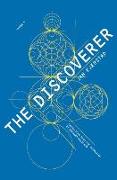The Discoverer
BücherAngebote / Angebote:
The final novel in a trilogy of books about the Norwegian television celebrity Jonas Wergeland, The Discoverer finds Jonas released from prison, having completed his sentence for the death of his wife. He has taken a job as a secretary aboard the Voyager, a ship which is exploring the far reaches of the Sognefjord--the longest fjord in the world. On the ship, Jonas works for a team of young people--including his daughter, Kristin--who are engaged in a multimedia project that is seeking to chart every aspect of the fjord in a new medium that merges text, image, film, and design. While the crew seeks to document the fjord, Jonas is busy exploring his past. For the first time in the trilogy he is allowed to tell his own story, and on board the ship he begins to recreate a manuscript that he wrote in prison, a book which he has already destroyed once, a book which seeks to explore the central mystery at the heart of Jonas's existence: the life and death of his wife Margrete. The Discoverer stands alone as a masterful novel in its own right--multivocal, throwing story after story aloft and examining each from numerous angles, and all at once. Incredibly, it also serves as the perfect complement to The Seducer and The Conqueror, both deepening the mysteries contained in those two novels and revealing the bottomlessness of so many others. Jan Kjaerstad once again draws us into the Wergeland universe, and he takes us on a journey that promises to finally discover the truth about Jonas's life, and his wife's death. One morning on board the Voyager, as we were about to bear due south into Aurlandsfjord, I came upon Jonas Wergeland sitting on a bollard. He was writing in a book which he must havebought in Laerdal, a big thick notebook with blank pages and stiff covers. We were just sailing past the Fronningen estate with its fine, white manor-house and the pine forest behind--we already knew that this was the family home of a famous painter, that the place even had its own art gallery. Martin was on the Foredeck, on the look-out for killer whales--a school had recently been spotted in the area. The smell of the loaves he was baking in the old wood oven was already drifting up from the galley. Jonas Wergeland made no attempt to conceal the fact that he was writing, he merely looked up, smiled. I noticed that he wrote in a big, neat script. Like a beginner, someone who has not had much experience of writing by hand. It occurred to me that he might have been inspired by the surrounding scenery, by Sognefjord. If, that is, it was not the suspicion, or the knowledge, rather, that I was writing about him. I had not meant to write anything. I do not know when the idea came to me. Maybe it was when he spoke about his auto-da-fe. He had spent several years working on a manuscript. As far as I know I was the only one ta have seen it. I thought of Nehru, who wrote a history of the world for his daughter while he was in prison. For some years I regularly received envelopes containing twenty or thirty pages which I, in turn, handed back when I went to visit him--or rather, they had to pass through security control before getting to him. I read it like a serial. He did not ask for my comments. Sometimes I would say something, other times not. Had I known that he would destroy it, I might have made a copy. Although I don't know. It was so--how can I put it--clumsy. Or, at least: there was somuch of it, it was such a muddle. As if he was forever trying to get everything down. Even so, now and again he would write a passage which completely bowled me over, something so dazzlingly astute and original. And poignant. I read it with a mixture of confusion and gratitude. He also wrote about people and events that no one else had ever mentioned. About Mr. Dehli the schoolmaster, about Bo Wang Lee, about a breathtaking kiss on Karl Johans gate. Nonetheless, I always had the feeling that he was circling around something, a central point which he could not capture in words. So when he destroyed the whole lot, every last sheet of it, I was struck by a sense of responsibility. I had read it. I remembered a lot of it. Certain details word for word even. And I knew that many of these stories deserved to be made public. Ought to be made public. I also had something of an advantage. I knew a lot from before. In my more presumptuous moments I actually felt as though I knew everything. I had once drawn pictures with him. I had sat up in a tree with him and asked him why the sky was blue. I had been a child in his arms. And a child sees a great deal. I did not know him from the television, I knew him face to face, I knew him with my fingers and my cheek and my nose. Not only that but, particularly during the years when my brain was at its most malleable, he had been the person to whom I talked the most. I loved him more than anyone in the world. If the young Jonas was right, if the whole point of life was to save lives, then I had a job to do: to save him, metaphorically speaking, from drowning in lies. What held me back was not my inevitable sympathy for him--I considered this a strength, not a weakness--but the thought of having to write a book, of actually putting words on paper. Because I realized that no other medium would do. If I was to get my message across. If I was to succeed in driving a wedge of doubt into the fossilized myths surrounding him. If I was ever to be able to say something about his genius, the origins of his creativity, the motives behind that peerless work of art Thinking Big--arguably Norway's greatest cultural contribution to the world in the twentieth century. I would of course have preferred to use my own form, my own medium, but that was still in its infancy, it was nowhere near being fully developed. And few people understood it. Few people were willing to understand it. I had to make a compromise, take up again a tool I had abandoned in favor of something better. I was also forced to resort to a genre, the biography, which was akin to an antiquated, all but obsolete--though still popular--fictional form. It scared me. To have so much to say, to know so much--and to have to employ such an imperfect, passe mode of expression. To risk being dismissed for being too conventional, for sticking to the set rules for how to render characters vivid and believable, notions based on simple, recognizable elements, a set of "valid" devices born of centuries of literature. I felt as though I was setting to work with a hammer and chisel. I knew, of course, that in undertaking this task, I was stepping out into a whole industry--or perhaps I should say: onto a battlefield. And the merchandise to be fought over was Jonas Wergeland, his life and reputation. Not least the latter. At the point when I started writing, eleven books about him--not to mention countless news reports and articles--had already been published. Of the eight which appeared after his conviction and imprisonment, six would have to be described as extremely negative, almost derisive, with their hindsightful, moralistic tone. The two exceptions were Kamala Varma's book and the curious biography, penned by another it is true, but at Rakel W. Hansen's behest. I soon realized that my own writing style had been colored by these two last-named works--possibly because in them I discerned something I could use, an approach which I recognized from my proper work. The writing of Jonas Wergeland's story should have been a laudable project. He was a figure from a period of change, in many ways the last representative of a bygone age, a television age, dare I say--an uncomplicated age. And yet, despite my good intentions I could not rid myself of an underlying skepticism. Or doubt. As I wrote, as I attempted to recapitulate some of the stories Jonas himself had grappled with in his manuscript, I kept wondering whether it was possible, in this limited and dauntingly simple form, to gain some clue to the one question which occupied me more and more and which rapidly became my deepest motive for writing: Why did he do it?
Folgt in ca. 15 Arbeitstagen

